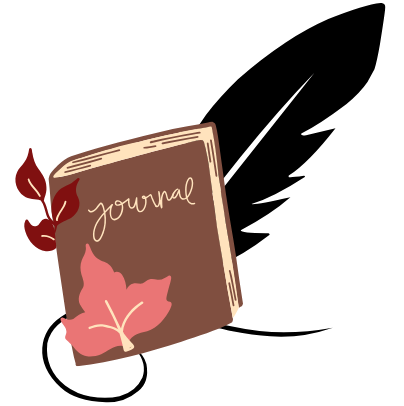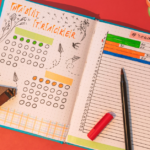Journaling has been a transformative practice in my life for over a decade now. The simple act of putting pen to paper or fingers to keyboard opens up a world of self-awareness, creativity, and personal growth.
Journaling goes far beyond just recording events or venting emotions – it’s a powerful tool for self-discovery, problem-solving, and even improving physical health.
The Importance of Daily Journaling
At it’s core, journaling involves regularly writing down your thoughts, feelings, and experiences. When done consistently, it becomes a form of self-therapy, creativity booster, and personal time machine all rolled into one.
Stress Reduction and Mental Clarity
One of the most immediate benefits you’ll notice when starting a journaling practice is a significant reduction in stress. Getting those swirling thoughts out of your head and onto paper has an incredibly cathartic effect.
It declutters your mind, giving you more mental space to think clearly and problem-solve effectively.
Research supports these benefits. A study published in the journal Psychotherapy Research found that just 20 minutes of expressive writing three times a week can significantly reduce symptoms of anxiety and depression.
It’s like giving your brain a daily detox.
Emotional Intelligence and Self-Awareness
Regular journaling serves as a mirror to your inner world. As you write, you’ll start to notice patterns in your thoughts, emotions, and behaviors.
This increased self-awareness forms the foundation of emotional intelligence – the ability to understand and manage your own emotions, as well as recognize and influence the emotions of others.
In my own experience, journaling has made me much more attuned to my emotional states. I can now catch myself before spiraling into negative thought patterns, and I’m better equipped to navigate complex social situations.
Goal Setting and Achievement
Your journal can be a powerful ally in setting and realizing your goals. Writing down your aspirations and the steps needed to reach them creates a roadmap for success.
Regularly revisiting and reflecting on these goals in your journal entries keeps them at the forefront of your mind, increasing your motivation and likelihood of achievement.
Getting Started: Choosing Your Journaling Method
There’s no one-size-fits-all approach to journaling. The key is finding a method that resonates with you and fits seamlessly into your lifestyle.
Traditional Handwritten Journals
Putting pen to paper has an inherently personal quality. The tactile sensation of writing by hand can be deeply satisfying, and studies have shown that it activates more regions of the brain than typing, potentially leading to deeper processing and better retention of information.
I recommend investing in a high-quality notebook and a pen that feels comfortable in your hand. The physical act of writing should be enjoyable, not a chore.
Digital Journaling
For those who prefer a more tech-savvy approach, digital journaling offers convenience and searchability. Numerous apps and platforms are available, each with unique features like mood tracking, prompts, and multimedia integration.
When choosing a digital journaling platform, be mindful of privacy concerns. Select a secure platform and consider using encryption for sensitive entries.
Bullet Journaling
Popularized by Ryder Carroll in 2013, bullet journaling combines traditional journaling with task management and planning. This method is highly customizable and can be adapted to suit various needs and preferences.
Journaling Techniques and Prompts
Now that you’ve chosen your medium, let’s explore some techniques to get those creative juices flowing.
Stream of Consciousness Writing
Made famous by Julia Cameron’s ‘Morning Pages,’ this technique involves writing three pages of unfiltered thoughts immediately upon waking. It’s an excellent way to clear your mind and tap into your subconscious.
I was initially skeptical about this method, but after trying it for a month, I was amazed at the insights and ideas that emerged. It felt like mining my own mind for hidden gems.
Gratitude Journaling
Focusing on things you’re thankful for can significantly boost happiness and life satisfaction. Try listing three things you’re grateful for each day, no matter how small.
This practice has been shown to rewire your brain to focus more on the positive aspects of your life.
Reflective Journaling
At the end of each day, reflect on your experiences, challenges, and achievements. Ask yourself questions like:
- What did I learn today?
- What am I proud of?
- What could I have done differently?
This practice helps you process your experiences and extract valuable lessons from them.
Prompt-Based Journaling
If you’re struggling with writer’s block, prompts can provide direction and inspiration. Some examples include:
- Describe your ideal day in detail.
- Write a letter to your future self.
- What are your top five values, and how did you live them today?
Overcoming Common Journaling Challenges
Starting a daily journaling practice can come with it’s own set of challenges. Here’s how to overcome some of the most common ones.
Consistency and Habit Formation
Building consistency is key to reaping the full benefits of journaling. To make it a habit:
- Set a specific time each day for journaling.
- Start small, even just 5 minutes a day.
- Link journaling to an existing habit, like having your morning coffee.
- Use reminders or habit-tracking apps.
Remember, it takes about 66 days on average to form a new habit, so be patient with yourself.
Dealing with Self-Censorship
It’s natural to worry about what others might think if they read your journal. This fear can lead to self-censorship, which defeats the purpose of honest self-expression.
To overcome this, remind yourself that your journal is for your eyes only. Give yourself permission to be completely honest and authentic.
If privacy is a concern, consider using a locked app or keeping your physical journal in a secure place.
Managing Perfectionism
Your journal doesn’t need to be a literary masterpiece. Striving for perfection can stifle creativity and authenticity.
Focus on the process as opposed to the product.
Embrace imperfections and remember that the goal is self-expression, not perfection.
The Science Behind Journaling
The benefits of journaling aren’t just anecdotal. Numerous studies have demonstrated it’s positive effects:
- A 2005 study by James Pennebaker found that expressive writing can lead to improved physical and mental health.
- A 2013 study published in Psychosomatic Medicine revealed that journaling about stressful events helped wounds heal faster.
- A 2018 study in the Journal of Experimental Psychology showed that journaling about future tasks can help people fall asleep faster.
These findings underscore the powerful impact that putting our thoughts and feelings into words can have on our overall well-being.
Journaling for Specific Purposes
While general journaling is useful, you can also tailor your practice to specific goals or areas of your life.
Professional Development
Use your journal to:
- Reflect on work challenges and successes
- Brainstorm ideas for projects
- Track your career goals and progress
- Prepare for performance reviews
I’ve found that journaling about work-related issues has helped me identify patterns in my professional life and make more informed career decisions.
Creativity and Innovation
Many artists, writers, and innovators have used journaling to spark creativity and generate new ideas. Try techniques like mind mapping, sketching, or free association to tap into your creative potential.
Exercises to Kickstart Your Journaling Practice
Ready to dive in? Here are some exercises to get you started:
The 5-Minute Brain Dump
Set a timer for 5 minutes and write non-stop about whatever comes to mind. Don’t worry about grammar, spelling, or coherence.
This exercise helps clear your mind and can often lead to unexpected insights.
The Gratitude Challenge
For one week, write down three things you’re grateful for each day. Be specific and try not to repeat items.
This practice can shift your focus towards the positive aspects of your life, boosting overall happiness and well-being.
The Future Self Letter
Write a letter to yourself 5 years in the future. What do you hope to have accomplished?
How do you want to have grown?
This exercise can help clarify your long-term goals and aspirations.
The Worry Release
Write down all your current worries and anxieties. Then, for each one, write one small action you can take to address it.
This technique can help reduce stress and promote problem-solving.
The Daily Highlight
Each evening, write about the most meaningful moment of your day, no matter how small. This practice encourages mindfulness and helps you appreciate the little things in life.
Advanced Journaling Techniques
Once you’ve established a regular journaling habit, you might want to explore some more advanced techniques to deepen your practice.
Shadow Work Journaling
Shadow work involves exploring the hidden or repressed aspects of your personality. Through journaling, you can safely examine these parts of yourself, leading to greater self-acceptance and personal growth.
To practice shadow work journaling, try writing about:
- Traits you dislike in others (these often reflect disowned parts of ourselves)
- Times when you’ve acted out of character
- Recurring dreams or nightmares
Dialogue Journaling
This technique involves writing a conversation between different parts of yourself or between you and another person (real or imaginary). It can help you gain new perspectives on situations or internal conflicts.
For example, you might write a dialogue between:
- Your present self and your future self
- Your logical mind and your emotional self
- You and a historical figure you admire
Unsent Letter Technique
Writing letters you never intend to send can be a powerful way to process emotions, especially in difficult relationships. You might write to:
- A person who hurt you in the past
- Your younger self
- Someone you’ve lost
Remember, these letters are for your eyes only, allowing you to express yourself freely without fear of consequences.
Integrating Journaling with Other Personal Development Practices
Journaling can complement and enhance other personal development practices. Here are some ways to combine journaling with other techniques:
Meditation and Journaling
After a meditation session, spend a few minutes journaling about your experience. Note any insights, emotions, or physical sensations that arose during your practice.
Goal Setting and Tracking
Use your journal to set SMART (Specific, Measurable, Achievable, Relevant, Time-bound) goals and track your progress. Regular reflection on your goals can help keep you motivated and accountable.
Therapy Support
If you’re in therapy, journaling between sessions can help you process your thoughts and emotions, making your therapy sessions more productive. Always check with your therapist about how best to use journaling to support your treatment.
The Role of Technology in Modern Journaling
While traditional pen-and-paper journaling has it’s charms, technology offers new possibilities for journaling in the digital age.
AI-Assisted Journaling
Some apps now use artificial intelligence to analyze your journal entries and provide insights into your mood patterns, recurring themes, and even suggest prompts based on your writing.
Voice-to-Text Journaling
For those who prefer speaking to writing, voice-to-text technology allows you to dictate your journal entries. This can be especially useful for capturing thoughts on the go.
Multimedia Journaling
Digital platforms allow you to incorporate photos, videos, and audio recordings into your journal entries, creating a rich, multi-sensory record of your experiences.
Ethical Considerations in Journaling
As you delve deeper into your journaling practice, it’s important to consider some ethical aspects:
Privacy and Consent
If you’re writing about other people in your journal, be mindful of their privacy. Consider how you would feel if they read what you’ve written.
Digital Security
If you’re using a digital journaling platform, research it’s security features. Look for end-to-end encryption and two-factor authentication to protect your personal thoughts.
Journaling and Mental Health
While journaling can be therapeutic, it’s not a substitute for professional mental health care. If you find yourself consistently writing about distressing thoughts or emotions, consider seeking support from a mental health professional.
The Long-Term Benefits of Consistent Journaling
Maintaining a regular journaling practice over months and years can lead to profound personal growth and self-understanding. Long-term journalers often report:
- Improved emotional regulation
- Enhanced problem-solving skills
- Greater self-compassion
- A clearer sense of personal values and goals
- A rich personal history to look back on
Journaling for Different Life Stages
Your journaling practice can evolve as you move through different stages of life. Here are some ways to adapt your journaling to specific life phases:
Journaling for Students
Students can use journaling to:
- Reflect on learning experiences
- Manage stress during exam periods
- Explore career aspirations
Journaling for Parents
Parents might journal about:
- Milestones in their children’s lives
- Parenting challenges and triumphs
- Balancing personal identity with parental responsibilities
Journaling for Retirees
Retirees can use journaling to:
- Reflect on their life experiences
- Explore new hobbies and interests
- Set goals for this new phase of life
Frequently Asked Questions
How long should I journal each day?
There’s no set rule for how long you should journal. Even 5-10 minutes can be beneficial.
The key is consistency as opposed to duration.
What if I miss a day of journaling?
Don’t worry if you miss a day. Simply pick up where you left off without guilt.
Consistency over time is more important than perfection.
Can journaling replace therapy?
While journaling can be therapeutic, it’s not a substitute for professional mental health care. If you’re dealing with serious mental health issues, ask a qualified therapist.
Is it better to journal in the morning or at night?
This depends on personal preference. Morning journaling can set a positive tone for the day, while evening journaling allows for reflection on the day’s events.
Try both and see what works best for you.
How can I make journaling a habit?
Link journaling to an existing habit, start small (even just a few minutes a day), and be consistent. It typically takes about 66 days to form a new habit.
What should I do if I don’t know what to write about?
Use prompts, write about your day, or try stream-of-consciousness writing. The important thing is to start writing, even if it doesn’t seem meaningful at first.
Is it okay to reread my old journal entries?
Absolutely! Rereading old entries can provide valuable insights into your personal growth and patterns over time.
Can journaling help with specific mental health issues like anxiety or depression?
Research suggests that journaling can be beneficial for managing symptoms of anxiety and depression. However, it should be used in conjunction with professional treatment for these conditions.
How can I keep my journal private?
For physical journals, keep them in a secure place. For digital journals, use password protection and encryption.
Always be mindful of who might have access to your writing.
Can journaling improve my writing skills?
Yes, regular journaling can improve your writing skills by providing consistent practice in self-expression and articulation of thoughts and feelings.
Key Takeaways
- Journaling is a powerful tool for stress reduction, self-discovery, and personal growth.
- Choose a journaling method that resonates with you, whether it’s handwritten, digital, or bullet journaling.
- Experiment with different techniques like stream of consciousness writing, gratitude journaling, and prompt-based journaling.
- Overcome challenges like consistency and self-censorship by setting realistic goals and giving yourself permission to be authentic.
- Use journaling to support specific goals like professional development or boosting creativity.
- Start with simple exercises to build your journaling habit and explore what works best for you.




